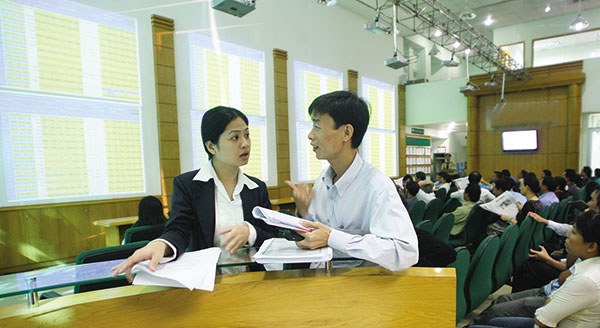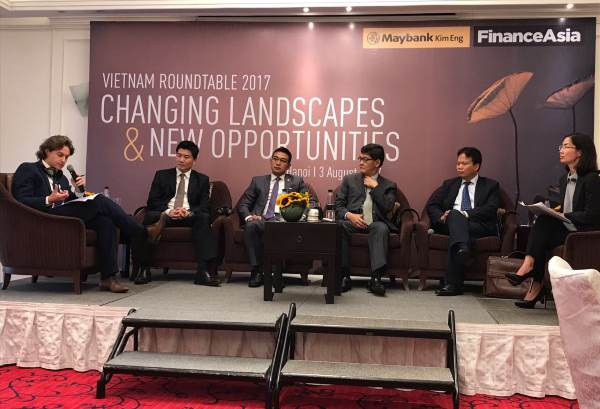MSCI upgrade may still far away
 |
| Foreign ownership limit and FX market liberalisation are among issues that are locking Vietnam from an MSCI upgrade, Photo: Le Toan |
Taking a look at the MSCI Global Market Accessibility Review released in June, the index provider’s grounds for not considering an upgrade for Vietnam come down to issues including the foreign ownership limit (FOL), FX market liberalisation, and investor registration and account setup.
Despite Vietnam’s efforts to lift the FOL at public companies in a number of sectors in 2015 – structured in Decree No. 60/2015/ND-CP – MSCI wrote in its report that “the rights of foreign investors are limited as a result of the
stringent foreign ownership limits imposed on both total as well as individual foreign investors”.
MSCI could be right in this assessment. Marc Djandji, director of Brokerage for Foreign and Institutional Clients at Viet Dragon Securities, said in an interview last December that there were numerous companies which “haven’t changed anything” regarding FOL.
Still Le Hai Tra, deputy managing director of the Ho Chi Minh City Stock Exchange, disagreed with the index provider, saying that even in developed markets like Japan, corporates in sensitive sectors like Japan Airlines and Fuji Media Holdings still set FOLs in accordance with local regulations.
“With reference to typical sectors such as banking, setting limits on the total ownership and on foreign institutional and individual investors would not necessarily affect their benefits,” noted Tra.
 |
Are we there yet?
It is not only Vietnam’s FOL issues that hinder its march toward emerging status, but also its operational framework. This is the area that MSCI deems most in need of improvement. Liquidity on the onshore currency market, according to MSCI, has been relatively low, while there is no offshore currency market.
In terms of investor registration and account setup, the index provider brought up the issue of language complexity that involves the translation of investors’ supporting documents into Vietnamese.
According to Saigon Securities Inc. (SSI), it could take quite some time for the country to switch to a more open foreign currency exchange regime. The Vietnamese dong is currently protected by the central bank through its capital control policy, as part of an attempt to maintain a sustainable economy and surplus balance of payment.
“It will take a long time to strengthen the economy and to make changes in regulations to have a solid ground for stock market upgrade,” said SSI in a March report.
Ticking the boxes
According to Dr. Chua Hak Bin, senior economist at Maybank Kim Eng Research (MBKE), Vietnam is no different from Pakistan – which was formally added to MSCI’s Emerging Market Index in June, Qatar, or other emerging market countries when it comes to concerns on liquidity and credit ratings. These are the sticking points preventing a local market upgrade, but it does not look like they will be in the way for long.
“Vietnam’s upgrade to emerging market status is a foregone eventuality, as soon as some of these boxes are ticked,” said the Singapore-based economist.
“I get the sense that there are some concerns over governance, given the dominance of state-owned enterprises. Accelerating equitisation, and improving liquidity and reducing the premium that foreigners have to pay on some of the shares because of FOLs will help speed up the upgrade,” Bin added on the sidelines of a roundtable on Vietnam’s changing landscape and new opportunities, held by MBKE in Hanoi in early this month.
Fraud, meanwhile, is difficult to completely abolish in any market, and also occurs in more developed markets like Singapore and Hong Kong. “It is not as if credit quality and governance are not issues in Indonesia, the Philippines, or Malaysia. There have been multiple cases in emerging markets where inventories disappear and cash on the balance sheet doesn’t actually exist,” Bin said.
“Frankly, if someone is set on committing fraud, no matter how you regulate, it’s not going to stop financial crime. But the country must have the appropriate system to charge the culprits and impose the appropriate penalties to deter such behaviour.
So it takes time, [and it’s] part of the maturing and learning process of any emerging market.”
Work in progress
It is only a matter of time, in Bin’s opinion, before Vietnam moves up the ladder from frontier to emerging market status. The market is already seeing tremendous growth and progress in terms of market capitalisation and trading volumes, and market access has definitely improved.
“I think it’s probably difficult this year, but probably by next year, there is a good chance that Vietnam will be upgraded to emerging market status,” Bin said.
He said he is “pretty confident” on the progress that the country has made so far. Growth is strong, and Vietnam has become more open to trade and foreign direct investment (FDI) than many other emerging markets. The export-to-GDP ratio is now higher than Thailand or Malaysia.
“I think when you look at the sharp increase in the number and breadth of Vietnamese companies listed, within a short span of time, it has been quite remarkable,” he said.
In terms of FDI in the market, Bin senses growing foreign interest and appetite, and he feels that inflows will accelerate if there are more opportunities and liquidity.
“There is a lot of interest because of Vietnam’s fundamentals, including rising
incomes, favourable demographics, and urbanisation, which will drive consumption and profits over a longer-term horizon, over the next five to 10 years,” he said.
In addition, the fact that Vietnam’s existing per capita income of around $2,000 remains low and well below most other emerging markets highlights the country’s potential to catch up and converge with other emerging and developed markets. Infrastructure investment is also progressing much more rapidly than in the rest of ASEAN.
“We like the dynamics, the fast-growing exports and the remarkable shift towards manufacturing from a largely agricultural and mining economy,” he added.
What the stars mean:
★ Poor ★ ★ Promising ★★★ Good ★★★★ Very good ★★★★★ Exceptional
Latest News
More News
- 0.1 per cent tax proposed on each transfer of digital assets (February 05, 2026 | 17:27)
- Ministry of Finance tightens policy delivery at start of year (February 05, 2026 | 17:26)
- Vietnam steps up market reforms as FTSE Russell reviews upgrade progress (February 05, 2026 | 17:20)
- 2025 profits mixed amid strong energy and farming results (February 05, 2026 | 17:18)
- Cashless payments hit 28 times GDP in 2025 (February 04, 2026 | 18:09)
- SSIAM and DBJ launch Japan Vietnam Capital Fund (February 04, 2026 | 15:57)
- Banks target stronger profits, credit growth in 2026 (February 04, 2026 | 15:43)
- Vietnam on path to investment-grade rating (February 03, 2026 | 13:07)
- Consumer finance sector posts sharp profit growth (February 03, 2026 | 13:05)
- Insurance market building the next chapter of protection (February 02, 2026 | 11:16)
















 Mobile Version
Mobile Version